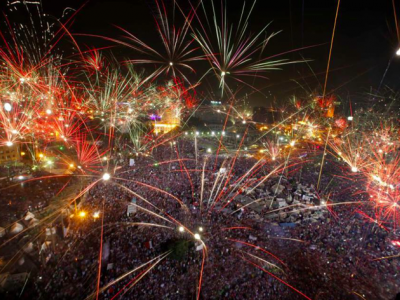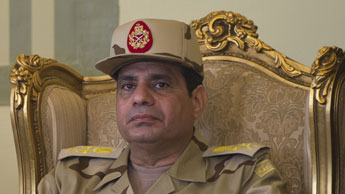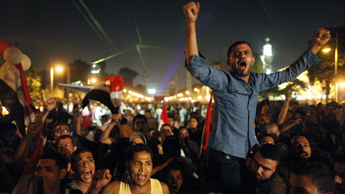Coup or whatchamacallit, Egypt is not Algeria, Pakistan, or any ‘stan
In the 48-hour lead-up to Mohammed Morsi’s ouster, the post-presidential expulsion talking points were already starting to emerge.
First, was the very fundamental issue of whether this military ouster of a democratically elected Islamist president is a good idea or bad one. In other words, do we slot this one in the “evil” or “admirable” box?
Next, the business of semantics: coup or revolution? Triumph of popular will or subversion of democracy? How are we supposed to spin this one?

Since military takeovers – temporary or longstanding – are not new, we can always look for parallels in other countries where khaki-clad generals have seized power from civilian leaders.
It doesn’t matter if different countries and societies have unique histories, contexts and circumstances. Everybody loves a good analogy.
We love it even more when we can use countries as metaphors. So, in a 12-month period, one West African nation moved from “Is Mali the next Afghanistan?” to “Mali is not the next Afghanistan”.
We set up a crap comparison, then knock it down. That’s how it is in this business.
In Egypt’s case, we narrowed it down to two Muslim-dominated countries.
The Algeria analogy started shortly after Egypt’s army chief Gen. Abdel Fattah al Sisi issued the 48-hour ultimatum on Monday night to Morsi and other Egyptian politicians to work it out or face the consequences.

For anyone who’s covered Algeria, this analogy is a jaw-dropper.
Yes, the Algerian military scrapped the 1992 elections, which the Islamist FIS (Front Islamique de Salut) party was expected to win, sparking a grotesquely ferocious civil war.
But Algeria has an unmatched history and context that stretches back from FLN domination, to Boumediene’s socialist isolation, to a brutal national struggle, to French colonial torture chambers, to…I can go on, but you get the point.
That did not stop the Times of Israel from proclaiming, “Overnight, Egypt becomes Algeria”.
You would think the Israelis would know the difference, but countries can apparently transmogrify overnight. Frankly, the Israelis should be happier with a military pouvoir-dominated Egypt than a Muslim Brotherhood-controlled Arab nation, so I don’t understand what they’re complaining about.
The Pakistan comparisons, I admit, were mostly harmless and hilarious. "Yaars,” tweeted one well-meaning Pakistani, using the Urdu word for buddies, “this whole military coup isnt such a hot idea. Please reconsider. Trust us. We have tons of experience - Pakistanis to Egyptians.”
Follow that dollar
Analogies done, let’s get down to semantics.
At the heart of the coup v. revolution debate lies that $1.5 billion US aid to Egypt – as we are being frequently reminded these days.
This is because the US has the 1961 Foreign Assistance Act, which mandates that Washington must suspend foreign aid to any nation whose elected leader is ousted in a coup d'etat.
Yeah, sure. Tell that to Haiti, Honduras and Pakistan – those are just the countries I can think of, there are probably a whole lot more. You see, the Foreign Assistance Act is as flexible as a contortionist – there are all sorts of legal provisions and presidential waivers that can keep Washington’s largesse flowing – as the Haitians, Hondurans and Pakistanis know.
Meanwhile, Sen. Patrick Leahy, chairman of Senate subcommittee overseeing foreign aid, has already said his committee will be reviewing “future aid to the Egyptian government as we wait for a clearer picture”.

I tweeted that Leahy announcement last night simply because it’s newsworthy and promptly received some very irate replies for my efforts.
“KEEP YOUR AID, YOU DON'T CONTROL US!” hollered one incensed Egyptian.
I hear you, angry tweeter. I understand the sentiment behind that rebuke - even if that $1.5 billion is critical in a country with plummeting foreign reserves, rising unemployment and spiralling inflation.
Secular liberal Egyptians v. secular liberal non-Egyptians
This “coup is a coup is not a coup or is it?” semantics is roiling a number of people in and out of Egypt.
Forget about the “deep division” clichés between Islamist and liberals. There’s now a yawning gap between secular liberal Egyptians insisting the events of July 3 was not a coup and secular liberal non-Egyptians hell-bent on proving them wrong.

So, for every Sandmonkey (the social media alias for popular Egyptian blogger Mahmoud Salem) tweeting, “Dear Foreigners, can you stop giving us lessons in democracy?” there’s a Robert Fisk calling it a coup or a Patrick Galey dishing out emotionally fraught lessons in democracy.
There’s not a single Egyptian who's unaware of the challenges and dangers facing his/her nation in the next few days and months.
The “Morsitimer” site that ticked down to the military’s 48-hour ultimatum earlier this week has been transformed into an “Egyptian Timer”. The site now features a roadmap checklist that includes the formation of a technocratic government and early presidential elections.
They’ve had more than two years to learn their lessons and yet lectures in democracy are being dispersed ad nauseam by armies of non-Egyptian pundits.
Overlooking the signs before the Arab uprisings
I’ve decided I’m just not going down that path anymore simply because I’ve been there, done that.
When I started out in journalism in the 1990s, the Algerian civil war was raging and that conflict overshadowed my coverage of the region for the next two decades - which is why those Algeria analogies really get under my skin.
My lessons from the Algerian conflict were pretty straightforward: this is what happens when the will of the people is crushed by the military. This is the difference between assertive French style secularism and US style passive secularism - which in foreign relations translates into anything from respecting the Islamist will of the people, to funding the mujahideen.
So, for many years, I viewed secular extremist elites in the region – from Francophile Algerians to Francophile Lebanese – with as much suspicion as Islamic fundamentalists.
After the 2000 Israeli withdrawal from Lebanon, for instance, I was big into the “Hezbollah has entered the political sphere” argument. That nuance lasted until years later - after Hezbollah had used their political base to consolidate their military power - a couple of Hezbollah thugs detained me for a couple of hours just to show me who’s the real boss in a country where the government doesn’t account for much.

Two years before the 2011 Arab uprisings caught us all by surprise, my Lebanese friends were trying to alert me to what they believe is an Islamist penchant for dominating and overpowering state institutions. “Your bullshit American coverage,” one of my friends once yelled at me at a Beirut dinner. “You don’t have to live here.”
But I was focused on being an objective journalist. Now when I see the Islamist v. secular debate raging in Tunisia, Egypt and Libya, I realize I overlooked the signs back in 2009.
The old order of autocracy crushing Islamist opposition is no more and after nearly 80 years of dominating the Islamist imagination, the Muslim Brotherhood has proved to be inept, deceptive and duplicitous in government.
If the Arab world is caught in the throes of an Islamist v. secular debate these days, it’s something they have to sort out, it’s not my business.
One thing I do know after all these years of covering post-colonial countries. Many of the roots of these conflicts, crises and civil wars go back to the critical political transition years – after independence or the fall of a political system. If the local founding father or Big Man was corrupt, bigoted or autocratic, for instance, the effects of his legacy will be felt years, if not decades, later.
Egypt’s democratic transition after Hosni Mubarak’s ouster has been rushed, manipulated and compromised – we all know that. We can hardly defend the “will of the people” after an election was pushed through before robust constitutional guarantees, allocation of powers among the branches of government, and institutional accountability between governments and citizens were put in place. In the end, Egypt may not be post-apartheid South Africa. But let’s give the Egyptians a shot – coup or no coup or whatever you want to call it.




2 Comments
Post new comment